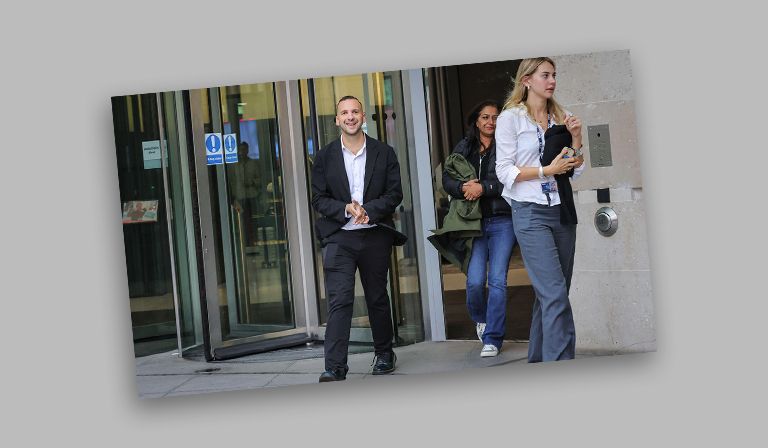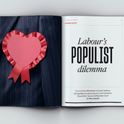Time for a PR campaign
Andrew Adonis (“Why you should stop thinking about electoral reform”, Prospect online, October) argues time spent considering reform is wasted as there is no certain route to change. Noting Nigel Farage has no interest in fair votes now that first-past-the-post (FPTP) promises to favour him, Adonis invites us to abandon hope. But the unprecedented fragmentation of British politics, with support split between more parties than ever before, should lead to the opposite conclusion. It is precisely because things are so volatile that we urgently need a better system and that a chance for reform could quickly materialise.
It is now “anyone’s guess what you get out of our electoral system”, says Professor Rob Ford. Under these conditions, FPTP delivers random, profoundly unrepresentative results where any party—even an extreme one—could win a majority on less than a third of the vote. With a record 60 per cent of the public in favour of change, it would be irresponsible to allow Britain to sleepwalk into such instability. MPs across the Commons are calling for a National Commission on Electoral Reform: a time-limited, independent process to review FPTP and alternatives and recommend a way forward. Whether its conclusions informed this government or future manifestos or governments, it is hard to argue against the merit of such a process.
I would also counsel Lord Adonis against too confidently predicting what the future holds for electoral reform. British politics has had a habit of upending expectations this last decade and, thanks in no small part to the voting system, it is now less predictable than ever before.
Alex Sobel MP, chair, APPG for Fair Elections
When you ask most people these days how they feel about politics, they say they don’t care—and who can blame them? Nothing meaningful ever happens in politics because FPTP encourages the status quo—the most boring party wins the election and then doesn’t do much when they’re in power, other than a tax raise here, a little bit of spending there, etc. For the sake of our future, we have to remain hopeful—without PR, politics will fail to resolve the most pressing challenges facing the next generation.
Steve Hutchinson, via the website
Adopting PR (“PR is no longer unthinkable”, Prospect online, August) would be an excellent move as it would give all voters more or less fair representation in parliament. Admittedly, it probably would also result in pesky coalition negotiations, as in my own country. On the whole, though, I think coalitions tend to discourage very partisan solutions that will be overturned at the next election.
Johan Enegren, Stockholm
In defence of Israel
You gave great prominence to Omer Bartov’s accusation that Israel has committed genocide in Gaza comparable with the Nazi genocide against the Jews (“State of denial”, November). No doubt it is being widely circulated among the Israel haters in our community, providing further justification for the kind of actions perpetrated in Manchester, with perhaps much worse to follow.
Of course, much of Bartov’s case can be contested, but not sufficiently in a mere letter. Can I suggest that you give equal prominence to a piece by someone with similar qualifications to Mr Bartov putting the Israeli side of the argument, thereby hopefully throwing some water on the flames that this article may have ignited. An obvious candidate is “It is not genocide” by Michael Berenbaum and Menachem Z Rosensaft from the news publication eJewish Philanthropy. Rosensaft teaches about the law of genocide at Cornell and Columbia. The authors are quite critical of Israel’s approach in this war but consider that Mr Bartov has gone much too far.
Another is by one of the world’s leading experts on urban warfare, John Spencer, in Newsweek: “Israel Has Created a New Standard for Urban Warfare. Why Will No One Admit It”. Publishing a counter view to Bartov would underline your claim to be a journal of serious debate rather than one which pushes just one point of view.
Stan Rosenthal, Haywards Heath, West Sussex
I read Omer Bartov’s insightful breakdown of ingrained Israeli mindsets and perspectives while a hard-won and hitherto seemingly impossible ceasefire in Gaza was inching closer to reality. I began to sense some positivity until I reached the last paragraph: “Israel will be able to confront its crimes only if it is forced to pay a high price for them, not thanks to a process of introspection”, adding that the United States and Europe must act.
But what form must any such “high price” take? Hasn’t there already been more than enough enforced punishment, hardship, retribution and bloodshed in this particular area of the Middle East? And at what point will any such price be implemented? And how? Will it have anything to do with diplomatic and lawful processes?
As for the involvement of US and European powers in stabilising Gaza, haven’t both done more than enough interfering in other nations’ disagreements and conflicts over the years? We’ve even had the ludicrous suggestion that Tony Blair be installed in Gaza to oversee the running of things in the interim—another glaring example of some world powers failing to read the room when it comes to international diplomacy.
Stefan Badham, Portsmouth
Before and after the flood
Katharine Quarmby’s piece (“The hell of high water”, November) powerfully reflects what communities from Brechin to Hemsby already know: the UK’s approach to flooding remains fragmented, underfunded and often unrealistic about what can be protected. The UK Climate Change Committee’s warning that the National Adaptation Programme is insufficient goes beyond budgets, it exposes a lack of honesty in our national conversation about what adaptation really means.
Flooding and coastal erosion are natural processes, now being intensified by climate change. They reshape coastlines, livelihoods and lives. There is no single solution, only a mosaic of human-centric adaptations, from engineered defences to nature-based approaches, to social and educational investments: schemes that must be created with the communities who live with water every day.
False hope and promising protection everywhere, forever, only deepens community mistrust. What people need instead is transparency, agency and education: the tools to understand their local water systems and the confidence to act before, during and after floods. My research with intergenerational communities shows that resilience grows through relationship-building, trusted partnerships, open and effective knowledge exchange, and full co-creation of locally grounded adaptations.
That’s why I’ve called for a national “Flood Education for All” initiative that works to embed flood and climate literacy in schools, workplaces and communities. Flood preparedness should be as instinctive as fire safety, empowering people to live safely and meaningfully with water and flood risk. If the new Floods Resilience Taskforce is to succeed, it must put participation and honesty at its core. Only by involving children, families and local networks in shaping local adaptation can we move beyond defence toward genuine readiness where every community, however vulnerable, understands both its risks and its strengths.
Living well with water means facing hard truths together and building trust and understanding, not walls.
Katie J Parsons, Loughborough University
The UK faces immediate and difficult choices about how to manage both current and future flood risks. For people in at-risk places flooding is now a recurring lived experience. The idea that any government of the day can or will “fix” flood damage is no longer credible. Financially, “holding the line” against rising water is rarely feasible for cash-poor councils already stretched to breaking point.
Katharine Quarmby is right that the communities have been abandoned—by a fragmented system that has failed to plan for the climate we are already experiencing, let alone the future one that our models predict. Nationally, we keep compounding the risk through poor planning and short-term decisions: building on flood plains, neglecting old drainage systems and leaving people trapped in uninsurable homes. Each quick fix locks in existing inequities and vulnerabilities as well as future losses. The habit of reacting rather than planning guarantees we’ll face the same devastation, or worse, repeatedly.
The question is no longer whether we can solve flooding, but how we live with it fairly. Communities deserve better than to be treated as a problem without their voices being heard. This means open, place-based discussions about realistic adaptation—including relocation where needed—led by communities themselves. If relocation or engineering defences are beyond financial reach, then honest dialogue is the only viable route.
Until we plan with those living the flood future, not for them, we’ll stay stuck in the same cycle. Bringing local knowledge and experience to shape what happens next isn’t a luxury—it’s the practical starting point.
Shona Koren Paterson, Centre for Flood Risk and Resilience, Brunel University of London
Independent thinking
As someone educated and who has taught at independent schools, I am distressed by widespread ignorance about the sector (“Cash for access”, October). The great majority of independent schools are not private, in other words owned. They are either charities—hence the dismay over VAT—or organisations such as the Woodard Corporation or the Girls’ Day School Trust. The range is enormous, from the most prestigious such as Eton and Harrow to very small schools, plus religious, online and free schools. What they share is educational independence and (with a few exceptions) fees.
Ros Taylor presents both sides of the independent schools argument but adds little that is new other than a few recent statistics, which should be treated with due caution. For example, the 1 per cent free places sounds pathetic but most schools are run on very tight margins and few can afford free places. Most offer discounted fees. Some may be able to make cost savings, but I suspect that is false as a generalisation. Yes, Winchester College charges £60,000 for boarders, but this is less than some so-called special units charge for taking Local Education Authority Send pupils. At least at Winchester they get a first-class education. Some year-on-year comparisons could easily have established whether closures are rising, and Taylor could have tried to get government statistics about the supposed £1bn savings claimed.
The government could have asked for much more from the independent sector. Instead it has alienated it for what can only be ascribed to Corbynite classist ideology rather than rational thought.
Education has suffered appalling neglect for well over a millennium. Three kings, Alfred, Henry VI and Edward VI, plus the later Victorians, were the only ones to take it seriously. It was left to the Church and then wealthy benefactors to provide grammar schools up to the end of the 19th century. Like it or not, nearly all genuine progress has come from the independent sector, which today I would grade B—could do better; grade C for the article, balance of strengths and weaknesses; and grade F for government policies and implementation.
Derek Turner, former teacher and schools inspector
Education is intensely personal because it’s about people’s children. Bringing politics into that relationship and, worse, “hurting” kids, feels like an act of gross political spite. The argument that charging VAT is for a public good is essentially the same one that drove Labour to abolish grammar schools in the 1960s, arguably the worst public policy decision since the Second World War. The result was levelling down.
Labour is wrong to think that private school fee payers didn’t vote for it. It has also failed to heed the unintended consequences from the grammar schools debacle: don’t mess with kids’ education, leave that to the parents.
Daniel Chamier, London
Reversing climate change
There are 13bn hectares of land on Earth, with 1.5bn hectares of arable farmland, 3.5bn hectares of pasture and four billion hectares of forest (“Get real”, November). If they were managed organically or regeneratively, if we stopped felling trees to generate electricity and if we stopped growing food like maize, sugar beet, wheat, barley, rapeseed and palm to produce gasoline and diesel we could easily reverse climate change.
University studies show that organic farms can sequester roughly seven tonnes CO2 per hectare, and rotational grazing can do the same. Forests do it all the time. That’s about 70bn tonnes of CO2 a year, twice the 37bn tonnes CO2 we emit annually. Stratospheric aerosol injection (SAI) is just another junk solution to climate change when farming and forestry can do the job, if we just stop burning food and wrecking the soil.
Craig Sams, chair, Carbon Gold Ltd, Hastings
On Conor Gearty
A splendid “In memoriam” conversation with Conor Gearty (“Let’s have some fights with the right enemies”, November). May Conor rest in peace. He is already sorely missed.
Phineas Finn, via the website












